Amplifying the Voices of the Mekong River Basin
- Amanda Flaim, Ph.D.
- Assistant Professor of Sociology
- James Madison College
- Department of Sociology
- College of Social Science
Project Overview
- An interdisciplinary team of experts is working collaboratively to raise awareness of the negative effects of hydropower on the Mekong River in Southeast Asia.
- Dams have caused major disruptions in the lives and livelihoods of the 60 million people who live along its banks.
Products/Outcomes
- Communities are supported by the team’s widespread expertise ranging from grant-writing to advocacy and art projects to call attention to the impacts of dams.
- In partnership with local community members, the team is calling for policymakers to better understand the ecological, cultural, and spiritual significance of the Mekong River.
Partners
- Alice Beban-France, Ph.D., Massey University, New Zealand
- Apisom Intralawan, Ph.D., Mae Fah Luang University, Thailand
- Chayan Vaddhanaphuti, Ph.D., Chiang Mai University, Thailand
- Chusak Wittayapak, Ph.D., Chiang Mai University, Thailand
- Chutima (Miju) Morlaeku, International Peoples Education and Culture Association of Thailand
- David Feingold, Ph.D., Ophidian Research Institute and UNESCO (United National Educational, Scientific and Cultural Organization)
- Kalyanee Mam, Migrant Films, Sundance Award Winning Filmmaker
- Linlang He, Ph.D., Mekong School, Independent Researcher
- Long Ly Vouch, Mekong School, Independent Researcher
- Malee Sitthikriengkrai, Ph.D., Chiang Mai University, Thailand
- Marina Pok, Annica Foundation and Cambodia Institute for Cooperation and Peace
- Niwat Roykaew, Chiang Khong Conservation Group
- Nopparat Lamun, Chiang Khong Conservation Group
- Sopheak Chann, Ph.D., Royal University of Phnom Penh and MSU Visiting Scholar
MSU Partners
- Daniel Ahlquist, Ph.D., James Madison College
- Dan Kramer, Ph.D., James Madison College and Fisheries and Wildlife
- Isabella Tirtowalujo, Asian Studies Center
- Siddharth Chandra, Ph.D., Asian Studies Center
- Wisa Wisesjindawat-Fink, Ph.D., James Madison College
- Yadu Pokhrel, Ph.D., Civil and Environmental Engineering
- Zoë McLaughlin, Southeast Asia Librarian
Form(s) of Engagement
- Community-Engaged Research
- Community-Engaged Service
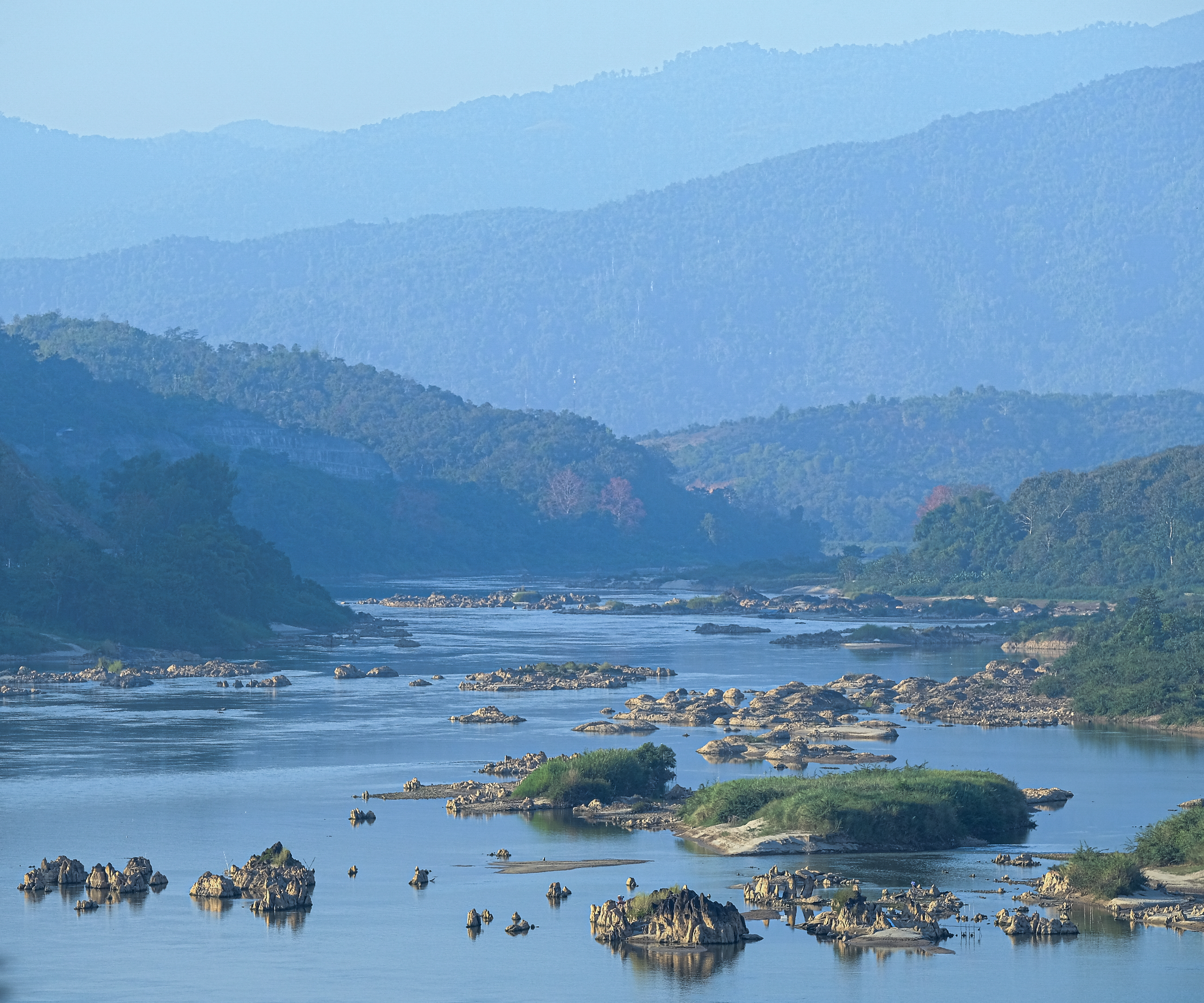
The Mekong River spans 2,700 miles through Southeast Asia providing resources to millions of people.
Credit: Goldman Environmental Foundation
The Mekong River has long been referred to as a “biological treasure.” The river winds through six countries in Southeast Asia—China, Myanmar, Laos, Thailand, Cambodia, and Vietnam—providing an abundance of resources, including fresh water, food, and transportation, for the nearly 60 million people who live along its 2,700-mile-long bank. The biodiversity of the river is said to rival that of the Amazon, with thousands of species of plants, fish, birds, mammals, and more calling the Mekong “home.”
In recent years, the river has begun to experience the detrimental effects of industrializing agriculture, water grabbing (unequal distribution of water), and perhaps the most pressing, rapid hydropower development in the form of dams.
The construction of dams has displaced many families and even entire communities, interrupting the traditional lives and livelihoods of people living along the Mekong.
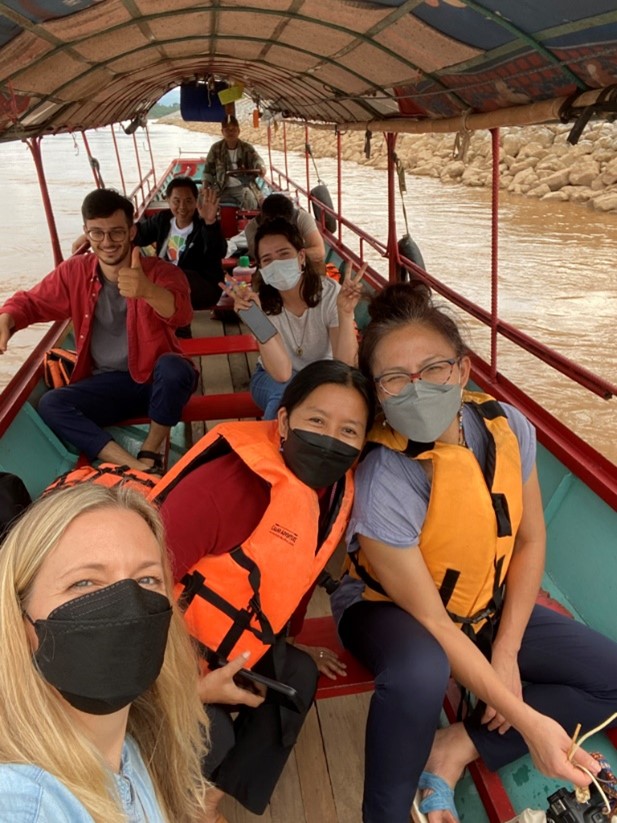
Mekong Culture WELL team and students on a Mekong boat at the Thai/Lao border
Amanda Flaim, assistant professor in the Department of Sociology, College of Social Science, and Comparative Cultures and Politics in James Madison College, has worked alongside and in support of Indigenous citizenship and land justice movements in the Mekong region for 20 years. She is currently leading a dynamic, interdisciplinary team of scholars and students at MSU in collaboration with community partners, artists, and experts across the Lower Mekong River Basin to keep the river and its ecological and cultural importance at the forefront of conversations.
“The Mekong River is significant in nearly every way imaginable, and its vitality should be of central concern to anyone interested in ecology, sustainability, international energy and climate policy, food justice, and cultural diversity,” Flaim said. “We aim to work collectively and inclusively to provide education and outreach opportunities while also amplifying the voices, stories, and knowledge of communities who are losing the most amidst this rapid domestication of the river. Our students here in Michigan have so much to learn from communities in the Mekong region. Freshwater justice, land grabbing [similar to water grabbing], and displacement remain critical concerns here on Turtle Island [North America] as well,” she said.
Flaim notes one major threat has been seen in the severe reduction of fish stocks. Fish and silt cannot move through the dams, undermining food security in the region and causing major hindrances to fisher people’s livelihoods and dramatically threatening cultural diversity that emerges through place-based practices. Beyond that, entire communities have been displaced due to the building of dams, and worse, the failure of dams.
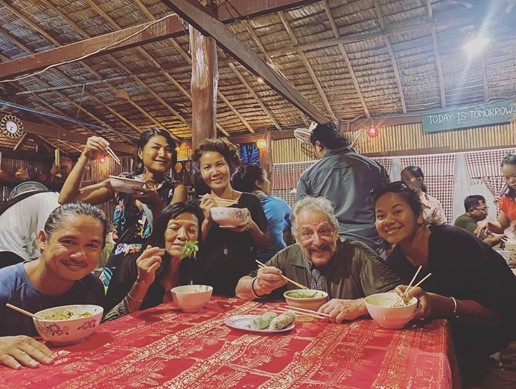
Mekong Culture WELL team and collaborators convene to devise a community research project. Clockwise from bottom left: (Sopheak Chann, Kalyanee Mam, Sophal Neak (artist), Sao SreyMao (artist), David Feingold, Marina Pok (May 2022)
Laos experienced these deadly effects in July of 2018 when the dam known as “Saddle Dam D” in the Mekong Basin collapsed, releasing billions of cubic meters of water that submerged entire villages, destroying homes, farms, forests, and essential resources. More than 70 people lost their lives, hundreds went missing, and thousands more were left homeless.
Dam construction is disrupting spiritual ceremonies and rites as well. “Our community partners across the region are deeply concerned about the cultural displacements that are happening,” Flaim said. “For example, when sacred fishing grounds are flooded by dams, communities cannot commune, fish, share their catch, and worship there. Additionally, when flooded forests die due to higher rates of drought from climate change caused in part by the dams, traditional ceremonies that have taken place there for generations now cannot.”
Cross-Cultural Collaboration
Wisa Wisesjindawat-Fink is a lecturer in MSU’s Department of Geography, Environment, and Spatial Sciences, as well as a co-lead of the interdisciplinary Mekong Culture WELL (water, ecology, land, and livelihood) project, which integrates satellite mapping and participatory, community-centered mapping methods to provide visual context to the detrimental impacts of hydropower developments in the region.
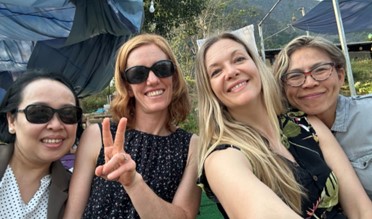
Somvilay Chanthalounnavong (professor, National University of Laos), Alice Beban-France (professor, Massey University), Flaim, and Wisa Wisesjindawat-Fink (lecturer, MSU) on field research visit in Vang Vieng, Laos (February, 2023)
Flaim has admired Wisesjindawat-Fink since they began working alongside one another 20 years ago. “I thought she was brilliant,” Flaim said. “We stayed in touch over the years while I worked on Indigenous movements in the uplands, and she became one of the world’s leading experts on Mekong fisheries and interdisciplinary mapping technologies. When the opportunity arose for MSU faculty and students to work on freshwater and land justice issues in Southeast Asia, I knew we needed to work with Wisa.”
Wisesjindawat-Fink’s long history of working in the Mekong region speaks to her dedication to the Mekong River and the people who live along it. “As an interdisciplinary scientist in the field of environmental geography, I’m passionate about exploring the complex relationship between humans and the environment with my primary focus being on the empowerment of communities,” Wisesjindawat-Fink said. “I’m able to promote community advocacy, ensuring local voices are included in decision-making processes, while also conducting mixed-method research to make a real impact on the people-water issues surrounding the Mekong.”
Flaim and Wisesjindawat-Fink work with a highly collaborative team of individuals from around the world, all yielding their expertise to the betterment of the Mekong region.
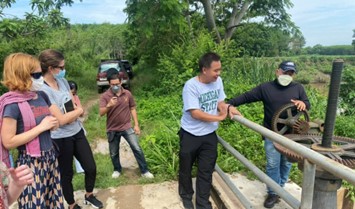
Mekong Culture WELL project partner Professor Apisom Intralawan teaches students and partners about the impacts of irrigation and dam development on communal lands (Chiang Rai, Thailand, June 2022)
“Many of our core team collaborators are longtime mentors of mine who have prioritized community-centered projects for their entire careers,” Flaim said. “Everyone has been so generous to share connections to build a truly unique team that also includes Apisom Intralawan from Mae Fah Luang University in Thailand, Sopheak Chann, an MSU visiting scholar from the Royal University of Phnom Penh, and the incredible team at the Mekong School.”
Chann, a geographer and environmental activist by training, grew up in a country that experienced many challenges surrounding environmental issues. “Learning about the Mekong River’s biodiversity and culture being damaged by the development of dams encouraged me to engage in social and environmental movements,” Chann said. “There is a lack of understanding between the actual environmental problems and education. My formal education and upbringing have directed my attention to bridging the gap between critical and intimate human interactions with environmental issues, and in the process, I’ve been able to work directly with communities, students, and like-minded scholars.”
With widespread support from their colleagues at MSU, Flaim, Wisesjindawat-Fink, Chann, and the team are working strategically to amplify the voices of people living along the Mekong in order to preserve it.
The support the team provides includes grant-writing to fund innovative community and regional advocacy projects, listening to community members to understand how they’ve seen the river change over time, generating community conversations and collaborative art production to raise awareness both within communities and globally about the links between ecological and cultural diversity and collapse, and providing expertise to governmental and non-governmental agencies on means of mitigating the impacts of dams.
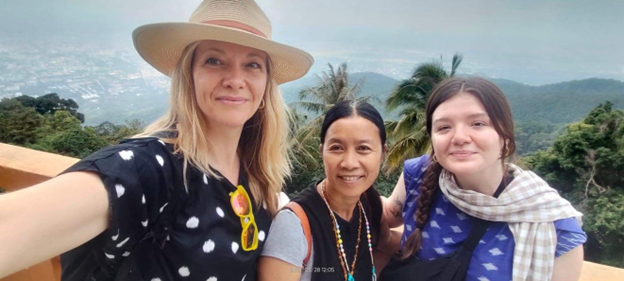
Flaim, longtime research collaborator and friend Chutima Morlaeku (Indigenous rights activist), and Mekong Culture WELL student Chloé Damon (now a graduate student at University of Michigan)
Flaim emphasizes that the work is anchored in interdisciplinary collaboration, with representation from engineers, conservation biologists, limnologists, sociologists, anthropologists, artists, and documentarians. “The leading voices in this project are experts and community members from and in the region,” Flaim said. “Our collaborators are Thai, Khmer, Lao, Vietnamese, and members of ethnic minority and Indigenous communities in Southeast Asia.
“Policymakers often only listen to STEM (science, technology, engineering, math) disciplines while largely ignoring community voice, and ways of knowing the river through traditional storytelling, art, and weaving,” Flaim said. “But much of the scientific evidence is echoing what fishing communities have known for ages—that the river is effectively dying. Science cannot capture the full complexity of the story, which is to say that when the river ruptures, entire ways of life and diverse ways of imagining futures are ruptured too. As a collective of scientists, social scientists, artists, documentarians, and community advocates, we’re trying to show that community experiences are a vital part of the river itself.”
With generous funding from the Henry Luce Foundation, MSU is working to integrate community voices and art with satellite and local mapping of the Mekong River to show how climate change and hydropower are affecting communities.
“This story is not about me,” Flaim said. “It’s about a big group of excellent humans working across boundaries and disciplines, languages, and nationalities to understand and educate people about a critical issue that concerns us all.”
‘I Am a Son of the Mekong’
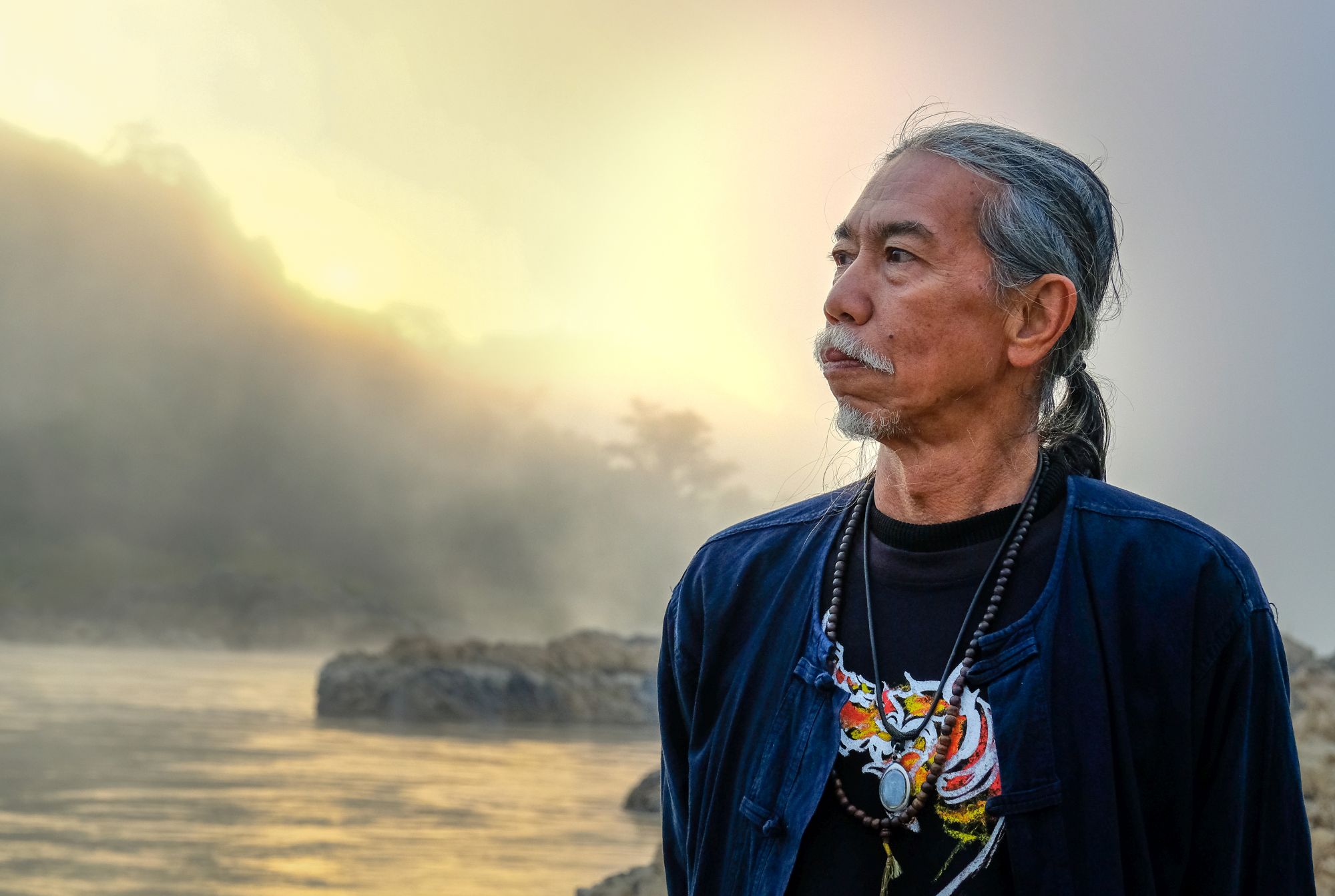
Niwat Roykaew (Khru Thi) looks out across the Mekong River.
Credit: Goldman Environmental Foundation
Niwat Roykaew, affectionately known as Khru Thi (“khru” means teacher in Thai), is the founder and a former teacher at the Mekong School in Chiang Khong, Thailand, which works with communities and youths to build a network of citizen scientists dedicated to monitoring and protecting the river. He now advocates for the river full-time with the Chiang Khong Conservation Group and is collaborating with scholars from MSU and around the world to protect it.
Khru Thi grew up along the Mekong, remembering the river in a very different state than it is now. “When I was young, the Mekong River was thriving in every way,” Khru Thi said in a video produced by the Goldman Environmental Foundation. “The main cause for the loss of the fish catch has been the dams upriver.”
He continued, “Before dams were built, there was no poverty along the river. We could fish to support ourselves, and we planted many different crops in the rich soil. The river is where we take baths and get water for home use. It’s also a playground and learning space.”
With the help of local communities, the Chiang Khong Conservation Group was able to stop a dredging project intended to accommodate 500-ton cargo ships, in turn preserving 250 miles of the Mekong—and livelihoods, food sources, homes, etc.—in the process.
Khru Thi’s advocacy efforts were honored in 2022, when he received the Goldman Environmental Prize celebrating his “achievements and leadership of grassroots environmental activities around the world.”
“We believe in the right of local communities to protect our own resources,” Khru Thi said. “This is not just for the Mekong—this is for the world as a whole.”
- Written by Emily Springer, University Outreach and Engagement
- Photographs courtesy of Amanda Flaim